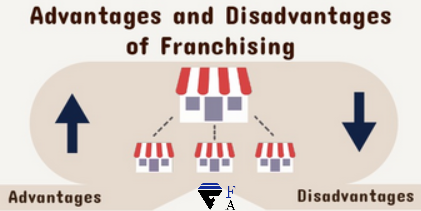
Advantages and Disadvantages of Franchising
Franchising is one of the most successful business models in the country and is a great option for building and growing a business. Like any business venture, however, franchising has its advantages and disadvantages. It is vitally important to understand the advantages and disadvantages of franchising, and all of the different facets of this business model to better navigate the industry. The sections to follow discuss the advantages and disadvantages of franchising, complied by the Franchise Administration team.

The Advantages of Franchising
Business Assistance
Franchising comes with business assistance from the franchisor. In some instances, the franchisee may quite literally receive a turnkey business. Others may not make it quite that easy, but they do offer knowledge and advice about the business. You will have access to reliable assistance to guide you through the process of owning and operating a business.
Brand Recognition
Another huge advantage to franchising is brand recognition. When you start a business from scratch, you have to spend time and money marketing your new business. With a franchise, the brand is already well established and people know what to expect from the business.
Capital
For business owners, franchising can help reduce some of the financial burdens associated with growing a business. Unlike organic growth, where an entrepreneur continues investing more of their own capital as they open new locations, franchising provides opportunities for unit-level expansion where the franchisee supplies the capital for the franchised location they bought. Franchisees pay an initial fee to join the franchise network, and they invest their own capital to develop and open their location.
Lower Failure Rate
In general, franchises have a lower failure rate than independent businesses. When you buy into a franchise, you know you are buying into a successful brand that has an existing customer base. They already have a proven business concept so you have reassurance that there is a demand for your product or service.
Legal Protections
Franchising is regulated at state and federal levels, and franchisors must adopt a Franchise Disclosure Document (FDD) in order to franchise the business. These laws can protect you against a slew of legal ramifications. Franchise Administration can assist to develop a conforming FDD.
The Disadvantages of Franchising
Initial Costs
The initial cost to buy into a franchise is generally more than you would spend to open an independent business. You will have to pay an initial fee to cover the cost of licensing the rights to their brand in addition to training expenses.
Lack of Control
Franchisees have limited control over the daily operations of their business. You will be required to comply with existing management operations, procedures, training standards, and hours of operation. You are also limited to offering only the approved products or services that have already been established by the brand. You will also be required to rely on the franchisor’s suppliers.
Potential for Conflict
While one of the benefits of owning a franchise is the support you receive, this can also create potential for conflict. There may be aspects in the business that you do not agree with, but you will have limited freedom to make changes. This can set the stage for conflict.
Lack of Financial Privacy
The franchise agreement will state that the franchisor can oversee the entire financial system. All financial information will be shared with the franchisor, leaving you little privacy in this facet.
Limited Creative Opportunities
When you start your own business, you have the freedom to operate your business any way you choose. With a franchise, however, you will have to adhere to existing rules so there is not much room for creativity when it comes to aspects such as marketing or designing a logo for the business.
For more information on the advantages and disadvantages of franchising – Contact Franchise Administration




